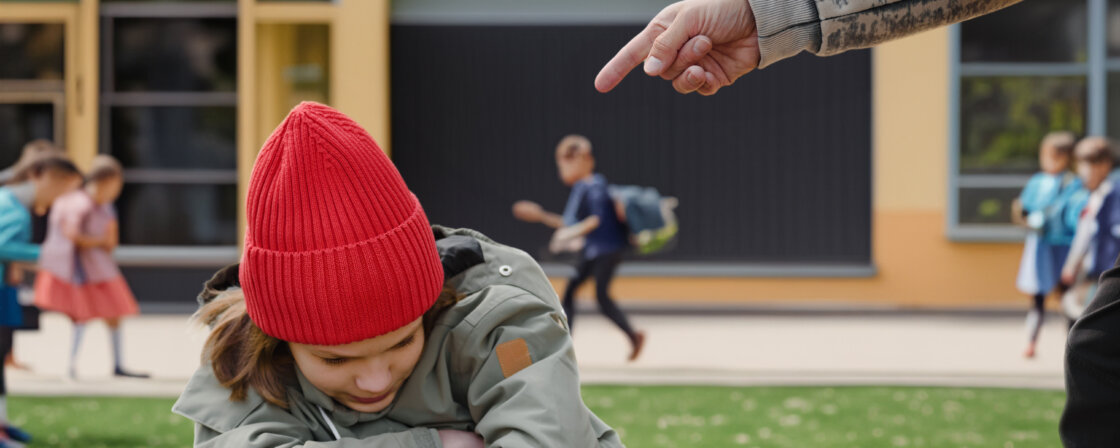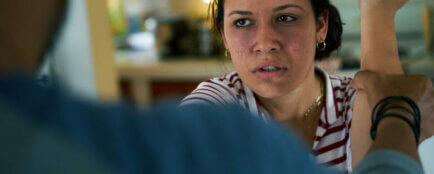The child as a victim of domestic violence
Children who grow up in an environment of domestic violence are always victims of domestic violence – even when they are not physically assaulted themselves. Just being present during conflicts between parents causes fear, anxiety and a sense of helplessness. Young children often do not understand what is happening, but perceive the tension and aggression. Older children try to “solve” the situation – they protect the weaker parent, try to prevent violence, or, on the contrary, develop defence mechanisms that lead them to apathy or aggression.
Prolonged stay in a violent environment negatively affects the child’s mental health. It can lead to behavioural problems, learning difficulties, anxiety, depression and, in extreme cases, suicidal thoughts. Statistics and expert studies confirm that children who have witnessed domestic violence have a greater risk of being either the aggressor or the victim of a similar relationship in adulthood.
Courts and experts now agree that domestic violence is not just a problem between partners – children also suffer the consequences. It is therefore important that the neighbourhood does not take a passive approach to these situations and helps the children at risk as soon as possible.
Legal tools for protection: how can the law help children at risk?
The legal system offers several ways to protect a child from domestic violence. The main one is the Civil Code, which allows the courts to intervene in parental responsibility if one parent endangers the child. The court can restrict the violent parent from exercising parental rights or remove that responsibility altogether. The aim is not to punish the parent, but to protect the child from a harmful environment.
Another important tool is the institution of interim measures, whereby the court can temporarily modify the custody of the child or prohibit contact with the violent parent. In addition, the child welfare authority (OSPOD) now has the power to apply for an interim measure even if the child has not been directly assaulted – it is sufficient that the child has witnessed domestic violence.
In acute cases, the police can use eviction orders, where the abuser must leave the shared accommodation for a fortnight.
This measure is accompanied by an obligation for the police to remove the abuser’s weapon (if he has one) and to inform not only the intervention centre but also the OSPOD and the public prosecutor’s office.
This measure gives the victim time to take further steps – for example, applying for longer protection through the courts.
If the domestic violence reaches the intensity of a criminal offence, the aggressor can be prosecuted for abuse of a ward or endangering the upbringing of a child. The state thus has various options for protection – but the key is for the child at risk or those around him or her to report the situation and use the legal means available to protect him or her.
Are you solving a similar problem?
Filing a criminal complaint
Have you found yourself in a situation that requires filing a criminal complaint? We are here to help. We will reliably protect your rights and handle the entire process for you. We’ll handle everything quickly and flawlessly so you don’t have to worry about a thing.
I want to help
- When you order, you know what you will get and how much it will cost.
- We handle everything online or in person at one of our 6 offices.
- We handle 8 out of 10 requests within 2 working days.
- We have specialists for every field of law.
Tip for article
It is said that it is indeed the one who knows us best who can hurt us the most. The phenomenon known as domestic violence is clear evidence of this. And as many victims confirm, the worst is not always the blows, but often the humiliation, intimidation and general psychological violence. In fact, injuries from such violence take much longer to heal. We have discussed this topic in more detail in our separate article.
What can a child do alone? Protection options and where to turn
A child experiencing domestic violence often feels helpless and does not know where to turn. But she has more options than she thinks. First of all, she should not keep the situation a secret – it is important to confide in an adult she trusts. This could be a teacher, a school psychologist, a doctor, a friend’s parent or another close person. These people are often in a position to take the situation further and help him find protection.
There are helplines in the Czech Republic where a child can call anonymously to get advice on what to do. For example, the Helpline (116 111) operates 24 hours a day and is free of charge. A child can contact it at any time and counsellors will help them find a safe solution.
The child also has the right to be heard in legal proceedings. For example, if a decision is being made about his or her custody or contact with an abusive parent, the court should hear his or her views. For older children, their wishes are taken into account even more rigorously. Since July 2025, the child also has an explicit right to be informed of his or her rights in proceedings concerning him or her – for example, by child welfare authorities.
The most important thing is that the child knows that he or she is not to blame for the violence and that there is a way out. Even if the situation may seem to have no solution, professionals and the legal system can help the child find safety.
How should the neighbourhood react? The role of the school, doctors, neighbours and relatives
Domestic violence often takes place behind closed doors, but its effects can be recognised. A child who lives in a violent environment may be frightened, withdrawn or aggressive. They may have unexplained bruises, be restless or have problems at school. If the environment notices these signs, they should not be ignored.
Doctors, teachers or social workers have a duty to report – if they suspect that a child is a victim of violence, they must inform the OSPOD (child protection authority) or the police. Neighbours, family members or friends also have the same option – although they are not bound by the law, alerting them can save a child’s life.
It is important to act sensitively and not to intimidate the child. If the child confides, he or she needs to be reassured that someone will help. You can contact the OSPOD, a school psychologist or an organisation that helps victims of domestic violence. In some cases, the OSPOD can now apply for an interim measure to protect the child – even if the child is not directly assaulted, but only in the presence of violence between adults.
Ignoring warning signs can mean that a child will remain in a violent environment. That is why it is crucial that the neighbourhood is not afraid to intervene – even an anonymous report can be the first step to saving the child.
The role of child protection authorities (OSPOD)
Child protection authorities (CSPOD) play a key role in protecting children at risk of domestic violence. As soon as they receive a report – whether from a school, a doctor, a neighbour or the child themselves – they must investigate the situation as quickly as possible.
The first step is to talk to the child and his or her parents. OSPOD staff try to find out how serious the situation is and whether the child is in acute danger. They can now also intervene in cases where the child is not the direct victim of violence, but merely witnesses violence between other members of the household. The OSPOD also has explicit authority to apply for interim measures if necessary to protect the child.
If they have reasonable grounds to suspect that the child is in danger, they can propose to the court an interim measure temporarily entrusting the child to the care of another parent, relative or foster parent.
In extreme cases where the danger to the child is serious, institutional care, i.e. placing the child in a safe environment outside the family, can be ordered. However, this is a last resort if no other form of protection can be provided.
The OSPOD also cooperates with the police and the courts and can file a motion to limit or remove parental responsibility from the violent parent. The aim is not to separate the child from the family, but to provide a safe and stable environment where the child will not be threatened physically or psychologically. The new legislation also includes an obligation for the OSPOD to inform the child of his or her rights when involved in proceedings – this also strengthens the child’s protection.
Domestic violence and parental rights: Is the abuser entitled to access to the child?
Domestic violence is not only a question of the relationship between the partners – it also fundamentally affects the child, even when he or she is not the direct victim. The courts are now increasingly taking into account that a child should not be exposed to contact with a parent who threatens his or her safety. Nevertheless, it is not automatic that the violent parent will lose contact with the child.
The court can modify contact in several ways. If there is a risk of endangering the child, it may prohibit contact altogether or allow it only in the presence of a third party, such as an OSPOD worker. Sometimes contact is ordered to be supervised in so-called supervision centres, where visits are monitored. This option is used more often in cases where one of the parents has been involved in domestic violence.
If a parent has been convicted of domestic violence, the court will often take into account whether contact with the child is in the child’s best interests. Conversely, the child’s right to protection from trauma takes precedence.
The decision on contact depends on the particular circumstances and evidence. The key is to ensure that the child does not feel compelled to maintain contact and is not subjected to further psychological or physical pressure. If the contact is risky, the child has the right to protection. Since July 2025, domestic violence has been legally defined in the Civil Code – this also helps the courts to assess the gravity of the situation more accurately and to regulate parental rights accordingly.
Tip for article
Is a slap too much, or is it part of parenting? What is still okay and what can be considered child abuse? Every minor has the right to protection from all forms of violence, whether it is physical punishment of children, psychological harm or child abuse. We take a closer look at the topic in our separate article.
New legislation: What changes to the Civil Code will strengthen child protection?
As of 1 July 2025, an amendment to the Civil Code is in force that improves the protection of victims of domestic and sexual violence, including children. The new legislation introduces stricter rules for assessing cases where a child is exposed to a violent parent and strengthens the rights of victims in court proceedings.
One of the key changes is the possibility to limit or remove parental responsibility more quickly for perpetrators of domestic violence. The law now explicitly obliges courts to take into account the existence of domestic violence when deciding on parental responsibility and access to the child. Previously, in some cases, the violent parent continued to be able to influence the child despite repeated court challenges. The amendment also stresses that the child’s contact with the violent parent should be considered in terms of the child’s safety, not as a right of the parent.
The Civil Code defines domestic violence in a completely new way in Section 3021. This includes not only physical and psychological violence, but also economic coercion, isolation or restriction of the victim’s freedom and needs. This definition simplifies the work of the courts, the OSPOD and the police – they have clearer criteria for when domestic violence occurs.
Another novelty is the strengthening of the protection of victims of domestic violence under interim measures. Courts will have clearer guidance on when it is appropriate to prohibit contact altogether or only allow it under the supervision of professionals. The amendment also allows the OSPOD to file a motion for a provisional measure if the child is in danger – even if only as a witness to the violence.
The aim of these changes is to prevent secondary victimisation of children, who often find themselves in protracted court disputes between their parents. The new rules are designed to ensure that their protection is paramount.
The Istanbul Convention: a legal instrument against domestic violence still awaiting ratification
Domestic violence against women and children is not just a private matter behind closed doors. It is a serious problem that requires clear rules and protection for victims. This is what the Istanbul Convention addresses – an international treaty that the Czech Republic signed in 2016 but has not yet ratified.
The Convention obliges states to prevent violence, protect victims and prosecute perpetrators. It points out that sexual and domestic violence often stems from the unequal status of women and men, and it is this imbalance that its measures target. However,the Convention stresses that the law must work in practice: victims must not be afraid to ask for help, the police must intervene quickly and the courts must rule fairly.
The statistics are clear – according to some estimates, one in three women will experience domestic violence. The Istanbul Convention is not a panacea, but it is a comprehensive framework for effectively combating this violence. And legal certainty for victims should take precedence over ideological disputes.
Summary
Domestic violence has a devastating impact on children, whether they are direct victims or witnesses. The Czech legal system offers several tools to protect them. The police can evict the abuser from the common home for up to 14 days, which provides immediate relief and room for further action. Courts can order interim measures extending this period up to 6 months or modifying child custody.
The child welfare authorities (OSPOD) also play a key role, monitoring the situation, communicating with the child, and can themselves propose judicial intervention if the child is at risk of harm – even if he or she is “only” witnessing violence between adults. In addition, the new law includes an explicit definition of domestic violence that includes psychological and economic forms of coercion, which helps to better protect children at risk and their loved ones.
It is important that the neighbourhood is not indifferent and reacts in time to signs of violence. This is the only way to avoid serious consequences for children’s psyche, healthy development and sense of security.




